My Internship at the EHU Bilbao
- Biology M. Sc.
- Spain, Bilbao
- Universidad del País Vasco (UPV)/ Euskal Herriko Unibertsitatea (EHU)
- 07/2024 – 09/2024
When I reached out to the Cell Communication and Transcription Lab at EHU Bilbao for a placement, I was quickly connected with my future supervisor. We arranged an online Zoom meeting, and from the start, I felt genuinely welcomed. She was incredibly helpful in organizing my stay, handling all the necessary university paperwork, and went out of her way to ensure everything was in place. It was at that moment I knew I would be well-supervised, and that this internship would be a great success.

© Jule Wahl
Although the university is located far outside the city, I was advised to find accommodation in the city center for better social connections and public transportation. I found my room on Idealista, a popular platform for finding apartments in Spain. For me, finding a reasonably priced room in a shared apartment near the river was relatively easy, but knowing at least some Spanish greatly helps in communicating with landlords, who often speak only Spanish. I ended up living with a girl from Catalunya, a girl from Peru, and one from France. Two of them were students, and the other was working. We got along really well, and they made every effort to make me feel welcome and comfortable in the flat. While we didn’t spend much time together in the end, it was still nice getting to know them!
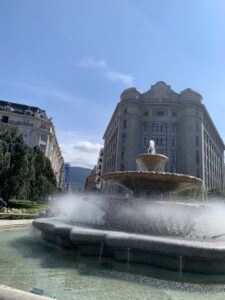
© Jule Wahl
My first impression of the city was different from what I expected of a typical Spanish city. This is because Bilbao is not quite Spain—it’s the Basque Country, something I later learned is very important to acknowledge. The architecture reminded me more of Central Europe, with modern and stylish buildings. The Nervión River flowing through the city provides a contrast to the otherwise dense urban landscape, creating a special atmosphere, especially at night when the lanterns reflect off the water. I really enjoyed taking walks by the river towards the old town, chatting with friends or responding to voice messages, as there are parks and green spaces along the way. The old town (Casco Viejo) is beautiful to explore and becomes even more vibrant at night. Every day of the week, you can find people enjoying drinks and Pintxos, the Basque version of tapas. My favorite Pintxos were the mini burgers and slices of baguette topped with various salads.
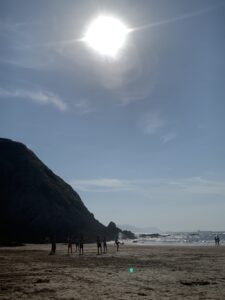
© Jule Wahl
Nature in Bilbao is lush and green, thanks to the high humidity and frequent rain. The surrounding hills and mountains offer excellent hiking routes with stunning scenery, such as the trails around Trapagaran. About 40 minutes from the city center by public transport, you’ll find large, beautiful beaches with breathtaking cliffs and sunsets. My favorite was Sopelana Beach, which I highly recommend for a spectacular sunset.
Because my stay coincided with exam season and the university’s semester break, there weren’t many students on campus, and the Erasmus students left a week after I arrived. However, I was part of the Happy Erasmus WhatsApp group for Bilbao, which allowed me to join their last gathering. Not knowing anyone in the city, I simply asked in the group chat if anyone was going out that night and if I could join them. A really nice Czech girl replied, and we met up with her group for a pre-party. We clicked instantly and had a fantastic night, which ended with a spontaneous swim in the sea. We went to a techno club called Sonora, which was a nice change from the usual bachata and salsa music. In general, Bilbao doesn’t have many clubs; it’s more common to go to small bars, particularly in Casco Viejo, where you can dance to loud music. If you’re looking for an experience full of partying and socializing with Erasmus students, I recommend coming during the semester when there are more activities and it’s easier to meet people. I also attended some language exchange meetings that I found on the Meetup app (which I highly recommend for meeting new people in a new city!) and created a Bumble BFF account specifically to find friends.
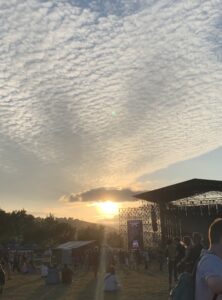
© Jule Wahl
During my stay in Bilbao, I was eager to follow the Euro 2024 football tournament in Germany, especially in the company of others. I heard about a German bar that always showed football matches, so I went there for the Germany games. I struck up a conversation with a group of young Germans, and we immediately hit it off. They were taking a language course in Bilbao, and from then on, we watched all the games together. The bar is also worth visiting—the owner is very friendly, and you can speak German with him! While I didn’t try the food, I heard great things about it. We watched the final at a public viewing event in Parque de Doña Casilda, which culminated in Spain’s victory. I also attended the popular BBK Bilbao festival, held on a hill just outside the city. It was easy to get there by bus, and we walked back afterward. I asked in the Erasmus WhatsApp chat who was going and if I could join, as I didn’t want to go alone. Fortunately, a German guy replied, inviting me to join him and his friends. We had an amazing evening, with the highlight being dancing to Jungle’s live performance. Bilbao and the surrounding towns have a lot to offer young music lovers, with numerous street fiestas and concerts during this time of year.
I highly recommend exploring the various towns around Bilbao, such as Portugalete, Santurtzi, Getxo, and Muskiz, which offer beautiful nature and charming towns. A day trip to the stunning city of San Sebastián is also well worth it, and the bus tickets are quite affordable! You can also easily travel to Madrid, Santander, Zaragoza, Vitoria-Gasteiz, Burgos, and other cities by bus or train, and if you prefer to fly, there are plenty of low-cost options to explore all of Spain.
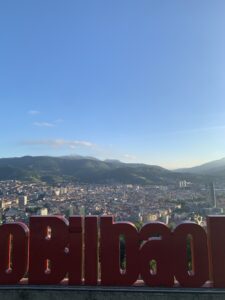
© Jule Wahl
My academic experience was also incredibly valuable. I learned a lot of methods and concepts related to working with mammalian cells and maintaining them in culture. The atmosphere in the lab was everything I could have hoped for, helping me realize what aspects are important to me in a working environment. I made many friends and colleagues who enriched my network, and I plan to stay in touch with them. This experience made me more open to meeting new people, finding ways to connect, and getting along with them right away. I’m certain it shaped my character in ways that only an experience abroad can.
My Internship in Paris
- Applied Geophysics M. Sc.
- France, Paris/ Clamart
- SLB Ribout Product Center
- 03/2024 – 08/2024
Application & Finding an internship
The Joint MSc Applied Geophysics is a two-year, joint degree masters offered by TU Delft in the Netherlands, ETH Zurich in Switerland and RWTH Aachen in Germany. Being a student in this unique programme, I had the incredible opportunity to spend a semester in each of the three countries to experience their diverse, yet suprisingly resembling cultures. As part of the graduation requirements, we are required to conduct full-time research in the final semester, with a list of topics provided by the three universities to choose from.
Interestingly enough, there are also external opportunities outside of the three aforementioned universities. In collaboration with one of the programme‘s universities, previous students have worked at research institutes in Norway, companies in Canada, and more. For our cohort this year (2024), there is an internship position from SLB (formerly Schlumberger) in Paris, France. However, we have to compete with students from other universities outside of the programme for this position.
To apply for the internship, I was required to submitted my CV, MSc transcript, and a motivation letter by November 2023. Fortunately, after just one round of interview, I was selected among more than four applicants to work at this prestigious oil and gas company starting from March 2024 for half a year! I must admit, I do feel slightly privileged to have received this internship opportunity, partly thanks to my MSc programme. Therefore I highly recommend that you start your search for an internship early—9 to 12 months before the start date should give you enough time for any administrative and visa applications that might follow. All the best!
Accomodation & Living expenses
Just like finding an internship, it’s best to start early when searching for a room or studio in Île-de-France once your internship is confirmed. Besides the influx of tourists, this bustling metropolis is home to numerous universities, making student housing short in supply.
When choosing a place to live, it’s wise to pick a location with night transport (Noctilien), ideally within Zone 3 of the IDFM transport network. Trust me, you don’t want to end up like me—trying to save money by living in a remote area for 575€/mo (17m2) with no late-night buses, only to find yourself increasingly relying on Uber to get home as your local social life takes off and the parties become more frequent…
To start with, Cite Universitaire (not a university, but a student housing cluster) is a great option for finding a room. Located at the edge of the city of Paris, it offers excellent all-day transport links and, best of all, an exciting student life if you’ve chosen to be an extrovert:: https://www.ciup.fr/en/
Another option is Twenty Campus, a private housing company geared towards university students, with SOME and only SOME of their residences conveniently located for all-day access to Paris: https://www.twenty-campus.com/en/map/
Remember to check reviews on Google or other platforms before selecting a residence!
Besides, the French government offers housing assistance to students living in France through the CAF scheme, which you can apply for after your first month of residence. You can learn more about it here: https://www.feelfrancais.com/apply-for-the-caf/
As for transport, you’re in luck! The IDFM network offers a student annual pass called the “ImagineR,” which costs €375 a year and is valid throughout Île-de-France, covering Zones 1 to 5 all year round. You’ll need your RWTH enrollment certificate and your internship certificate to apply. Learn more about the scheme and save a LOT of money here: https://www.iledefrance-mobilites.fr/imagine-r
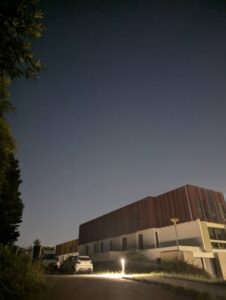
My place is tranquil, but it’s just horribly far away from everything. ©Tin Long Ryan Ko
(Best of all, since you are working as an intern in France, your company is required to reimburse a portion of your transport ticket cost. This means you might end up paying less than half the price of the pass!)
Other expenses in France are quite comparable to that of Germany. Eating out might cost a bit more (at around €20), but trust me, the quality of French cuisine and their hospitality is absolutely worth the extra penny. And if you’re a young museum enthusiast, there’s even better news—most French museums are free for students from EU universities. If you have some free time off work, don’t miss the chance to enrich your cultural knowledge and catch up with the Frenchies!
Digital payment is very common in France, so you can definitely get by without cash for long – unlike in Germany. Here’s a breakdown of my average monthly expenses in Euros:
- Accommodation 575 €
- Food (and groceries) 250 €
- Insurance 70 €
- Travelling/ Misc. 230 €
…bringing my total to around 1150 € per month for everything. Pas mal !
Everyday life/ the internship
While I can’t share the technical details of my internship, a typical workday generally goes like this if I’m not teleworking: It takes me 45 minutes to get from my residence to the office (thanks to my less-than-ideal location), arriving around 10:30 am. I code for a bit, then enjoy lunchtime with my fellow interns from 12:30 pm to 2:00 pm. After that, there’s more coding and occasionally some meetings in the afternoon. I usually leave the office by 5:30 pm at the latest. Although I work 35 hours a week, I’m allowed to telework about two days a week on average. So, the work is pretty flexible, as my supervisor put it: “Just finish the work on time, and you’ll be fine. Don’t let me know where you work.”
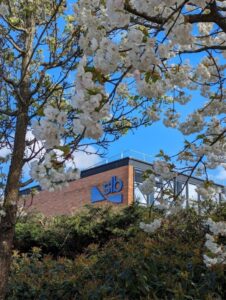
Looks chill, but definitely not inside. ©Tin Long Ryan Ko
Are the French chill at work? I guess it depends on the workplace. Since SLB is a global company, some colleagues do end up having to be available at 3:00 am for meetings with American and East Asian headquarters. While my colleagues aren’t too surprised to receive Teams messages outside of official work hours, I have to admit, this did shatter my fantasy of the laid-back French workplace… Hierarchies were flat, though, so there is nothing to worry in this regard.
Don’t take my everyday life in Île-de-France as a reference, though, since the city was in full swing preparing for the 2024 Olympic Games (Jeux Olympiques) while I was enjoying the higher-than-normal living standards in the metropolitan area. Transport was smooth, stations didn’t smell like human excrement, and everyone was surprisingly willing to (try to) speak English rather than French. There was abundant security and police patrolling the streets… All my friends who have lived in Paris for a long time say this was just a dream, and I’ll definitely experience the renowned Paris syndrome the next time I visit.
Anyway, whenever the weather is nice, I like to head into the city, stroll around, visit some museums, take pictures for memories, and indulge in some of the best pastries in the world. I also meet up (or party) with my friends every week or two, eventually causing myself to order an Uber more and more, though it’s definitely worth it.
And if you want to add a touch of romance to your time in Paris, play some songs by Laufey, or any bossa nova in your earphones – it’s an absolute sensation.

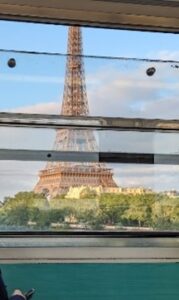
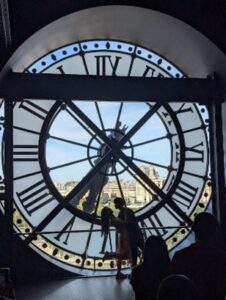
Come on, at least travel to these three places if you are in Paris. ©Tin Long Ryan Ko
Free time/ tips
“If you are lucky enough to have lived in Paris as a young man, then wherever you go for the rest of your life, it stays with you, for Paris is a moveable feast.” ― Ernest Hemingway, A Moveable Feast
C’est vrai.
But what did Hemingway mean by ‚movable feast‘, though? I suppose it differs from one to another person. It can be your romantic life, a galore of museums, endless pub crawls, or just simply the scrumptious food that Paris has to offer. I can’t personalize any solid advice to you reading this now, but do make the most of your time in Paris. Don‘t just stay at home working – that you have done plenty already in Aachen.
I hope the tips and links I’ve written above are practical and helpful. If not, here are some additional general tips that I‘ve brainstormed:
- Moving from A to B within Paris (zone 1 – 2) usually takes 30 minutes, while travelling to/from outside Paris can take about an hour. (Again, try to find a place to live within zone 3!)
- Purchasing pastries from supermarkets, especially baguettes, is a crime.
- There’s no such thing as bad weather, just bad clothing.
- Tap water is LEGALLY free in Parisian restaurants.
- Always be a bit more cautious of your valuables.
- Generally, districts south of the Seine and to the (south-)west of the city are safer.
- Learn some French from Duolingo or any similar apps before you arrive. Definitely useful when you take an Uber or venturing outside of Paris…
- Use both IDFM app AND Citymapper to traverse around the metropolitan.
And as a final tip: travel more! You can earn your expenses back when you start working, but you might well only be in Paris/ France once in your lifetime. France has so much to offer – from the snowy Alpine resorts to the relaxing French riverera, from the historic Normadie to the unique Basque country, you’ll need to visit France 1000 times to truly grasp what the hexagon is all about. The same goes for Paris, that she is both modern and historical, elegant and filthy, refreshing and gothic.
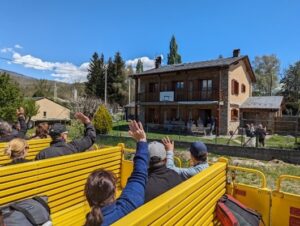
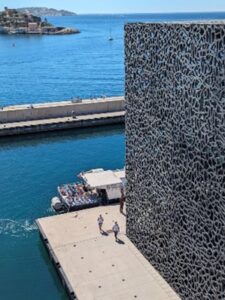
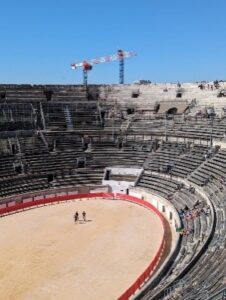
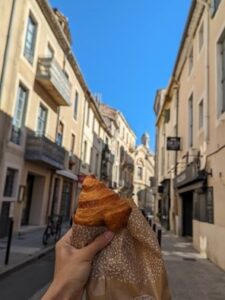
©Tin Long Ryan Ko
Conclusion
Do I have Paris syndrome?
Perhaps I caught the opposite syndrome – I didn’t think I’d enjoy Paris, only to find her seductive allure lingering in my mind now that I’m writing this.
Paris is a horrible place. It’s dangerous, it‘s dirty, everyone is rude as hell and don’t speak English, everything is expensive, and it’s not romantic at all.
With that, you are all set to explore the city. Enjoy 🙂

Paris 2024 opening ceremony. It’s not what you know, but who 😉 ©Tin Long Ryan Ko
Doing a Research Internship at the UiT in Norway
- Psychology M.Sc.
- Norway, Tromsø
- University of Tromsø – The Arctic University of Norway
- 04/2024 – 08/2024
Going abroad the second time in my life posed a challenge, yes, but a less intense one than being a volunteer in South Africa after finishing school. Hence, the whole stay (planning included) was easy going and associated with anticipation and the joy of revisiting the most beautiful country in the world.
Starting my master program at RWTH in winter 23/24, I already had everything laid out. As I wanted to go abroad during my second master semester, I started thinking about research internship possibilities when I finished my bachelor’s degree in March 2023. As my bachelor thesis supervisor was on a one-month exchange in Tromsø and spoke very highly of one professor at the UiT (The Arctic University of Norway), I asked her for connecting me to her. She did, and fortunately the professor at the UiT invited me to come to Norway and work as a research intern for her. This turned out to be the start of a fruitful, respectful and somehow deep supervisor-intern relationship. She is a very capable, very humorous and very kind person. Next to living in the far north (with its midnight sun, polar lights and spectacular hikes), she was my highlight during my whole stay.
Norway is an expensive country. Nevertheless, the German inflation made the transition rather easy. Groceries can be affordable if you know which grocery store to visit and which products to buy. My rent was a different story: For a single room in a shared flat (of eight people) in a student housing I paid 410€. This is the same amount I pay in Germany for my student apartment. On the good side, Norwegian flat mates are the most quiet and respectful people I have ever met, hence, living with eight people was pleasant.
I have adapted my lifestyle drastically. While in Germany I used to meet friends at a café or a restaurant, in Norway I never ate out. I did not party at all, as alcohol is luxurious here, and cut back on my shopping expenses. Although it seems bad, it was a refreshing and grounding experience and let me think about what I take for granted in everyday life.
During the internship I was extremely high in autonomy. My supervisor and I met every Monday noon to talk about new tasks and projects. Next to this, I was flexible regarding my working hours, working place (I switched between the institute, the UiT library and the public library in the city center) and working pace. After work, I either hit the gym or went home to play the piano. My piano teacher and I kept doing lessons via FaceTime. Taking my hobbies from Germany with me helped a lot, especially during the first few weeks, to find my rhythm.
The biggest and most meaningful project during the internship was being a co-author in a review paper we submitted to the Journal of Business & Psychology. It took us from May to August to get the data, analyze them and write the manuscript. Hopefully, the manuscript will undergo a brief review process and will be published at some point. Next to the review paper, I got a lot of insights in the publishing process and data analysis. Furthermore, I could get creative while designing a scientific poster and developing new lecture materials.
The best thing to do while in Norway is hiking. It is for free. And please, just look at the photos:
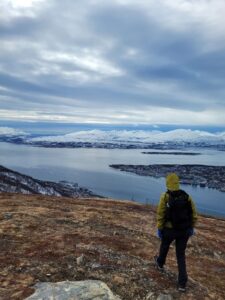
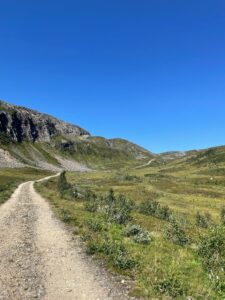
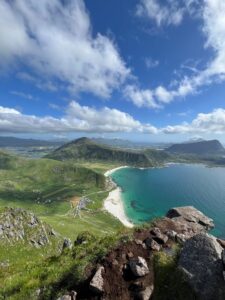
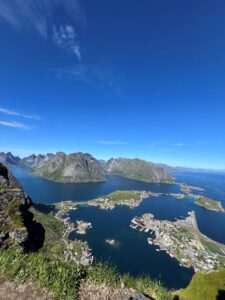
© Charlotte Hopp
If it is raining, I enjoyed reading a lot. And that have been my last five months: Hiking, exercising, reading, baking. My family visited for two weeks, in which we went on a road trip to the Lofoten and Vesteralen islands. This vacation I will remember dearly. Of course, friends of mine visited now and then – this was a welcome disruption from everyday life. But I must admit that nowadays it is easy to stay in touch. Being 3000km away from Aachen, I learnt that deepening friendships and fostering my relationship can sometimes be easier even when apart.
I am writing this report one day prior to leaving Norway. It has been a wonderful time, helping me finding an answer to the one question that made me consider a research internship in the first place: “Do I want to do a PhD?” My answer: “Yes, but not abroad!” Additionally, I would like to say a big thank you to the Erasmus office that made my whole stay possible. Thanks for your support, organizing everything neatlessly and being reliable throughout the whole stay.
Internship at Mercedes Formula One Team in the UK
- Business Administration and Engineering: Mechanical Engineering B.Sc.
- United Kingdom, Brackley
- Mercedes-AMG Petronas Formula One Team
- 07/2023 – 07/2024
Application/Finding an internship
The application process for the internship was quite lengthy and kicked off around September 2022 for a start in July 2023. In England, it is very common for students to include a year in industry in their studies, so you will find many available internships across various fields. The duration is usually one year because this is the standard period for university students unless it is a pure summer internship. Ultimately, the internship duration will depend on which internship you apply for and what is offered by the companies you are applying to. If it is a bigger, international company, it is very likely that they will help you a lot with the application process for a visa and put you on a company insurance scheme. This can differ significantly between companies. Following people from that company on LinkedIn can help you if internship positions become available as they are often shared there too.
Accomodation & Living expenses
While grocery prices are in a similar range as German grocery prices, the costs for housing and running costs such as electricity, gas, and water will be significantly higher in the UK. For me, they came out at around £80/month per person in a shared house with two other people, which is very high. Rent was over £500/month per person too, which is around what you can expect in this area and is comparable to what other interns living in or near Brackley had to pay as well. Still, this comes as quite a shock when moving to the English countryside from a German university city. Breakfast, lunch, and dinner were served in the company restaurant, and I usually ate lunch and dinner there for £2.80 per meal. The food was delicious, and the menu changes every week to offer great variety.
As Brackley is a small town, you will have to work through the local letting agencies’ websites, but there is a good network of incoming and leaving interns that provides opportunities to easily take over apartments, which I highly recommend. This also alleviates the pressure to buy furniture as the places either come furnished or you will be able to buy furniture off your predecessors at a low price. To be able to rent an apartment, you will need a valid visa. Many letting agencies will be understanding of these circumstances and offer to wait for your visa approval. After the visa gets confirmed, you can then take the next steps to set up a UK bank account, for which I recommend Revolut. Also, with a registered address, you will be able to apply for an NI (National Insurance) number, which is crucial for the company to pay you a salary.
Everyday life/ the internship

© Nicolas Musiol
Apart from the amazing work atmosphere and interesting projects that the team entrusted me with, you will work alongside a young team and will join the company with a group of around 40 interns/industrial placements (short IPs). Working on projects together, enjoying lunches and dinners in the Hub (the company restaurant), quickly formed a big group of close friends. You’ll find yourself very quickly going to the local pubs or to parties in Banbury or Oxford together. Out of the 40 IPs, there is always a good mix of internationals with Brits. My year had people from Australia, the US, Canada, Luxembourg, Austria, Germany, the Netherlands, Croatia, Ireland, and England, which made for a very interesting mix of people.
Many other sports clubs give you the opportunity to mingle with locals, as Mercedes has its own cycling club, a football team, and many sports courses. Outside of the company, you will find a tennis club, a rugby club, and a leisure centre with a pool, so there are plenty of activities for you to do in your free time. I would also highly recommend volunteering at the local football club. Every Wednesday around lunchtime, they organize a lunch for the elderly and disabled at the clubhouse, and they are always looking for a helping hand. They have lovely stories to tell, and you will find that many of them can give you great recommendations as they know the area inside out.
Free time/tips
Weekend trips with my newly found friends took me to Liverpool, Bath, Bristol, Cornwall, and on a ski trip to the French Alps, and many smaller adventures. A fantastic weekend activity is trying to complete all the local parkruns, which is a local run event held every Saturday at 9 am over a distance of 5 km. You can put all your running experience to the test by competing in the annual Silverstone Race in May, where you lap the race circuit two times for a race distance of 10 km. Great views along the way and thousands of participating runners make it a great event.
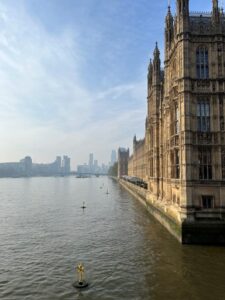
© Nicolas Musiol
Being located close to Banbury, which has a train station with a direct connection to Birmingham and London, one can hop on a bus to the neighbouring towns and villages to explore those or use them as a transit possibility to explore the country. A day trip or weekend trip to London is always great fun, and I’ve been many times now, as I’ve come to love London for the many different boroughs like Shoreditch, Camden, Kensington, Chelsea, and more. Each of them has a unique vibe, cool cafes, shops, restaurants, and pubs which are worth exploring.
Around Brackley, there are two airfields, both within walking distance. They make for a nice jog around them while small sports planes take off over your head or land on the small runways. For the daring, they even offer tandem parachuting. You can also visit the many golf clubs around and test your swing on the driving range. You only have to pay for balls as they will give you clubs to practice with if you don’t have any.
There are nice cafes all around Brackley as well, my personal favourites being The Old Fire Station in Brackley or the Post Office Café in Evenley. I can also recommend taking the bus to Oxford and visiting museums there, going punting on the canals, or visiting the local colleges.
There is also Stowe School in Buckingham only a few minutes away if you have a bicycle. The Stowe estate has a scenic park with many beautiful temples and arches. It makes for a nice afternoon stroll, especially on nice summer evenings.
Conclusion
All in all, I can only recommend committing to an international internship and immersing oneself in a foreign environment. Even though a full year exceeds the mandatory internship requirements of the RWTH, I can assure everyone it is an amazing experience, and I would do it again without a shadow of a doubt. I’ve greatly benefited from this year in the UK, not only professionally by working my dream job in F1 but also personally by meeting a lot of amazing people.
My experiences at Tsinghua University
- Business Administration and Engineering: Mechanical Engineering M.Sc
- China (VR), Beijing (Peking)
- Tsinghua University
- 09/2023 – 07/2024
Before the stay
Course Planning: It is recommended to get an overview of the selectable courses at Tsinghua University, depending on the respective department, such as Mechanical Engineering, Industrial Engineering, Energy & Power Engineering, and Automotive Engineering. Additionally, it is strongly advised to clarify which classes are eligible for acknowledgment – both Aachen courses at Tsinghua University and Tsinghua courses at RWTH Aachen. One must be cautious about course acknowledgements between Tsinghua University and RWTH Aachen. Based on past experiences, it is generally more challenging to get Aachen courses acknowledged at Tsinghua University than the reverse. This discrepancy necessitates early communication with both institutions. Students should verify which Tsinghua courses will be recognized for credit upon return.
Visa: After receiving the Tsinghua University acceptance letter confirming your stay abroad, a visa appointment should be made as soon as possible. It is likely that the Tsinghua University acceptance letter may arrive quite late. In the past, it was possible to make appointments at both the Düsseldorf Visa Centre and the Frankfurt/Main Visa Centre. Currently, according to my information, the Düsseldorf Visa Centre is closed. If time before departure to China is short, it is recommended to visit the Frankfurt/Main Visa Centre and pick up the visa personally. This way, it is possible to receive the visa within approximately 3-5 days, based on 2023 information. The visa application process involves filling out a detailed online form prior to the appointment. It is recommended to gather all necessary documents, including the acceptance letter, passport (which is valid for the whole stay plus six months, that is, at least 18 months), possibly recent photographs, before beginning the application. Completing this step efficiently can prevent unnecessary delays.
Health and Vaccinations: According to my GP in Germany, no extra vaccinations were needed. However, depending on your travel destinations in East Asia during the winter break in January and February, it might be recommended to receive vaccinations against typhus, hepatitis B, rabies (3-4 doses), and yellow fever. Students should consult their GP or healthcare provider in advance to ensure they are adequately prepared for any planned travel in the region. Besides, it is recommended to sign up for an international health insurance for the complete year.
Travels: It might be helpful to book a flight to Beijing about three months in advance. Possibly due to low demand for flights between Germany and China, the prices for one-way flights were generally rather low (between 350-500 Euros, depending on the booking time). For those planning a round-trip, one challenge is that flights generally can only be booked up to 365 days in advance. Given that the return flight will likely be in July, longer than a year from the outbound flight, this limitation can be an issue. One solution is to book a relatively inexpensive round-trip ticket and postpone the return flight once the return date is finalized. Some airlines offer flexible options for changing the return flight at a low cost, making this a potentially more economical option than booking two separate one-way flights.
Experience in the host country
Accommodation: Tsinghua University offers various dormitory options on campus for international students. There are three different room types available for internationals: First, single rooms with a private bathroom and a small sink (“Single Rooms”). Second, double rooms with shared bathrooms and separate bedrooms (“AB-rooms”). Third, double rooms that consist of a shared bedroom only (“Double Rooms”). The latter do not include any private bathroom or kitchen, as these are shared by the entire floor. The university is gradually renovating all Single Rooms, converting them into Double Rooms. Consequently, the likelihood of securing a Single Room or AB-room will steadily decrease over time. The 2023/24 Aachen cohort was the first to receive Double Rooms instead of Single Rooms.
Most of the 2023/24 Aachen cohort lived in Zijing Building 23, with a few students placed in Building 19 or Building 6. Buildings 6, 22, and 23 are recommended, if possible, as these are relatively newly renovated buildings.
In general, life in the dormitories is communal, with shared spaces like bathrooms and kitchens (depending on the room type). This setup encourages interaction among students, fostering a sense of community. However, it also requires some adjustment, particularly for those used to more privacy.
Dining and Food: Tsinghua University has a lot of dining halls on campus, offering a great variety of food options with a very high quality. The meals are very affordable (normally between 0,80 Euros – 3,00 Euros) and cater to diverse tastes, with a mix of Chinese cuisine and many international options. For those who prefer cooking, some dormitories have shared kitchens where students can prepare their own meals. The quality of the canteens, however, are outstanding for college food.
Off-campus, the Haidian district offers numerous restaurants and food stalls, where students can explore local Beijing cuisine. Street food is also popular and provides a quick and inexpensive way to enjoy traditional Chinese snacks.
Extracurricular Activities: Tsinghua University is known for its vibrant campus life. There are numerous clubs and societies catering to various interests, including sports, arts, music, and technology. For international students, joining these clubs is a great way to meet new people, practice language skills, and immerse in Chinese culture.
Sports facilities at Tsinghua are top-notch, with options for basketball, soccer, swimming, tennis, and more – all of them quite close to most of the international dorms (Zijing 18-23). The university encourages students to stay active, and many participate in regular sports activities. The high-end on-campus gym and fitness centers are also popular among students.
Cultural activities are abundant, with events such as traditional Chinese festivals and holidays, art exhibitions, and extraordinary performances regularly held on campus. Tsinghua’s proximity to cultural landmarks in Beijing also makes it easy for students to explore the city’s rich history during weekends or holidays.
Transportation: Getting around Tsinghua University is convenient, as the campus is well-connected by public transport. Bicycles (especially Blue Bikes from HelloBike) are a popular mode of transportation among students, as the campus is large, and cycling is often the quickest way to get to classes or dining halls. For longer trips, the Beijing subway system is easily accessible from the university, providing a reliable and efficient way to explore the city.
Challenges and Adaptation: For international students, adapting to life at Tsinghua can be both exciting and challenging. The language barrier and cultural differences may initially pose difficulties, but the university offers support services, including language classes and international student offices, to help ease the transition. The campus community is generally welcoming, and many Chinese students are happy and eager to practice their English and learn about other cultures, which can make integration easier.
Daily life at Tsinghua University is dynamic and diverse, offering a mix of academic rigor, cultural experiences, and social engagement. While the challenges of studying at one of China’s top universities can be demanding, the opportunities for personal growth and cultural exchange make it a rewarding experience for both local and international students. Whether through academics, campus life, or exploring Beijing, students at Tsinghua have the chance to engage deeply with both their studies and the rich cultural environment surrounding them.
Experience at the host institution
Academic Life: In our case, classes typically started at 9:00 AM in the first semester. The university offers a wide range of courses across its 21 schools and 59 departments. For international students, classes might vary depending on the department and program, but the workload is generally not too demanding, but quite extensive. Students often attend lectures, participate in group discussions, and engage in research projects. The grading in general is quite fair and benevolent.
Coursework at Tsinghua is challenging, with high expectations from professors. However, the university provides ample resources to support students, including libraries, research facilities, and academic advisors. International students may find the Chinese language barrier challenging at times, though many courses are offered in English, particularly in graduate programs.
Culture at Tsinghua: Tsinghua University provides a rich array of cultural opportunities that allow students to immerse themselves in Chinese history, arts, and traditions. The university regularly hosts cultural events such as Chinese music performances, traditional dance showcases, and art exhibitions that celebrate the country’s heritage. Students can explore Tsinghua’s and Beijing’s renowned museums (Tsinghua has got two of them), participate in traditional arts and crafts workshops, and attend festivals like Chinese New Year, the Mid-Autumn Festival, the Moon Festival, or the Dragonboat Festival which are celebrated with great enthusiasm on campus. Tsinghua’s proximity to cultural landmarks, such as the Forbidden City, the Temple of Heaven, and the Summer Palace, also offers students a chance to delve deeper into China’s historical treasures. Furthermore, engaging with Chinese students through clubs, sports, music, social events, and collaborative projects provides invaluable insights into contemporary Chinese culture and customs. These interactions foster cross-cultural friendships, where international students can learn directly from their peers about local traditions, cuisine, language, and daily life, enriching their overall experience at Tsinghua.
10 tips for new students at Tsinghua University on how to make the most of a one-year stay:
1. Explore Beijing’s Cultural Heritage: Take advantage of Tsinghua’s location in Beijing by visiting iconic landmarks like the Forbidden City, the Great Wall, the Summer Palace, and the Temple of Heaven. These historical sites offer a deep dive into Chinese culture and history.
2. Participate in Campus Festivals and Events: Engage in traditional Chinese festivals like Mid-Autumn Festival celebration on campus. These events provide a unique cultural experience and an opportunity to bond with fellow students.
3. Attend Cultural Performances: Tsinghua hosts various cultural events, including Chinese opera, (traditional Chinese) music concerts, and dance performances. These are great opportunities to experience traditional and modern Chinese arts firsthand.
4. Visit Local Markets and Try Chinese Cuisine: Explore Beijing’s and other cities’ local markets. In Beijing, the Silk Market and the Pearl Market are highly recommended, if you are interested in bargaining. Also, be adventurous with Chinese cuisine by trying local dishes such as Peking duck, hotpot, and dumplings.
5. Explore China Beyond Beijing: Plan trips to other parts of China during breaks. Visit cities like Shanghai, Xi’an, Qingdao, or Chengdu to experience the diversity of China’s landscapes, history, and culture.
6. Engage with Chinese Students: Building friendships with local students is invaluable. Join language exchange programs, participate in group projects, or simply hang out at campus cafes to foster these connections and gain deeper insights into Chinese culture.
7. Join a Student Club or Organization: Tsinghua has a wide range of student clubs, from sports across arts to technology. Joining a club is a great way to meet new people, develop new skills, and immerse yourself in campus life.
8. Learn Mandarin: While many courses are offered in English, learning some Mandarin will enhance your experience and make daily life easier. The university offers language courses, and practicing with local students will definitely accelerate your learning.
9. Take Advantage of Tsinghua’s Academic Resources: Make use of the university’s libraries, research facilities, and academic lectures. Attend guest lectures by prominent scholars and leaders from various fields to broaden your knowledge.
10. Stay Active and Use Campus Facilities: Tsinghua has excellent sports facilities, including gyms, swimming pools (inside and outside), and sports fields. Regular physical activity can help you stay healthy and relieve stress during your stay.
What added value did the stay have for my studies/career prospects?
A stay at Tsinghua University significantly enhanced my studies and career prospects in several ways.
Academic Excellence: Tsinghua University is renowned for its high academic standards and rigorous programs, especially in fields like engineering, technology, and business. The exposure to cutting-edge research, advanced coursework, a high focus on teamwork, and a global academic environment deepened my knowledge and skills in my field of study. This academic rigor might be highly regarded by employers and can set one apart in competitive job markets.
Language and Cultural Skills: Learning Mandarin and immersing myself in Chinese culture has been a big benefit, especially if one intends to work in industries or companies that have strong ties to China. Proficiency in Mandarin and an understanding of Chinese business practices can make someone a valuable asset to multinational companies or organizations operating in China.
Global Perspective: Studying at one of China’s top universities provides a unique international experience. It allowed me to gain insights into China’s rapidly growing economy, technological advancements, and global influence. This international exposure can make one more adaptable and culturally aware, qualities that might be increasingly valued in today’s globalized world.
Problem-Solving and Adaptability: Living and studying in a new country requires adaptability and resilience. The challenges I overcame during my time at Tsinghua, whether related to academics, language, or cultural issues, helped me to develop problem-solving skills and the ability to thrive in diverse environments. These are qualities that might be valued by employers in any industry.
Career Opportunities in China: China’s economy continues to grow, and having experience at a Chinese university like Tsinghua can open up career opportunities within China or with Chinese companies abroad. Being part of the Tsinghua alumni network can also provide valuable career opportunities.
Networking Opportunities: Tsinghua University attracts some of the brightest minds from China and around the world, offering an excellent opportunity to build a global professional network. The connections you make with fellow students, faculty, and industry professionals can open doors to future collaborations, job opportunities, and mentorship.
In summary, your stay at Tsinghua University not only enriches your academic background but also equips you with valuable skills, global perspectives, and professional networks that can significantly boost your future life both in China and internationally.
To what extent does my stay abroad have a sustainable character? To what extent could the general public also benefit from my personal experience?
My stay abroad at Tsinghua University has a sustainable character in both environmental and social aspects, with potential benefits that extend beyond my personal experience. By immersing myself in China’s approach to sustainability and environmental practices, particularly in areas like energy, engineering, and electromobility, I have gained valuable insights into how we can implement more sustainable solutions in our own communities. For example, learning about cutting-edge renewable energy technologies and urban sustainability initiatives at Tsinghua and in Beijing, especially regarding electromobility and public transport, allows me to bring back knowledge that can be applied to projects aimed at reducing environmental impact and promoting greener practices in my home country. This might contribute to a more sustainable future by helping to develop solutions that minimize resource consumption, lower emissions, and promote long-term environmental health.
On a social and cultural level, the public might benefit from my experiences through the sharing of cultural knowledge and perspectives. By engaging with local communities and sharing my experiences, I can help foster greater cross-cultural understanding and empathy, which is crucial in an increasingly globalized and polarized world. This cultural exchange can also lead to stronger social bonds and collaboration between different communities, promoting peace and mutual respect.
Emotionally, the empathy and cultural sensitivity I have developed through this experience allow me to better relate to people from diverse backgrounds, which can positively influence my interactions with others. This emotional experience can help in creating more inclusive and supportive environments, whether in the workplace or in the community.
Financially, the skills and knowledge I have gained might lead to more effective and innovative approaches in my field, which could translate into economic benefits. For example, by applying sustainable engineering practices learned, I can contribute to cost-saving measures and resource efficiency in projects, which benefits not only companies but also society as a whole by reducing environmental costs and promoting sustainable growth.
In summary, my stay at Tsinghua University allows me to bring back knowledge and practices that contribute to environmental sustainability, while also fostering social and cultural benefits for the public. By sharing my experiences and applying what I have learned, I can help create a more sustainable, inclusive, and interconnected society.
My Erasmus Traineeship in Valladolid
- Medicine
- Spain, Valladolid
- Universidad de Valladolid
- 01/2024 – 06/2024
My name is Felix and I’m a medicine student from Aachen, Germany. This year I spent 6 month of my practical year taking part in a hospital Internship at the University of Valladolid in Spain.
Preparation
As for the preparation I first reached out about a year before my stay to the Erasmus coordinator and the dean of the Faculty of Medicine at the university. Although sometimes hard to reach, he will eventually answer you and help you with whatever request you might have. He recommended me to contact two other doctors to organise the different parts of my internship. Eventually I organized my stays with the respective heads of the different departments and presented my final rotation in internal medicine and surgery to these two doctors to get their confirmation.
Arrival and Organisation
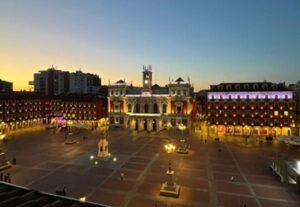
©Jan-Felix Wolters
I arrived 1 week prior to the start of my internship, which gave me time to visit the international office and organize the formalities. Although I could not be matriculated without taking any assignments, they were very helpful and worked out a way to provide me with the student badge. That way I could take part in the university sport and other programs, such as the GUM, which is a group of students and other people that go on hikes every 2nd Sunday throughout the entire year. In order to get set up for the hospital, I had to go to the Dean’s office, where the friendly employees helped me go through the process of registering for my internship, which included receiving my nametag and clothes for the hospital. For this process a “Certificado de los delitos sexuales” is necessary. This was very easy to get at the local state’s office. I got a date within 3 days and it only took them 1-2 days to get the necessary information from Germany and to send me the certificate via email. All in all the people were always very friendly and helpful which made the process easy, even though some things couldn’t be resolved right away.
Accommodation
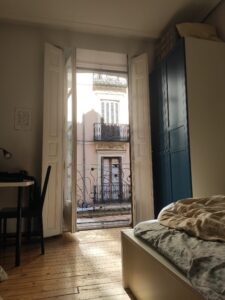
©Jan-Felix Wolters
Accommodations in Valladolid are surprisingly cheap and easy to find. Rooms in a shared flat generally range between 180 and 350€. Studios aren’t much more expensive either. The main website used is Idealista, but you can also find rooms through facebook (watch out for scammers). I wanted to get to know people which is why I was looking for a flatshare. After only about 3 days of search I found a very nice room in a central apartment right next to the main shopping street. Although not very good equipped and a bit lived through, the apartment was very nice and that way I got to know other international people. It is worth to mention that in Valladolid (and other Spanish cities from what I’ve heard) it’s common for landlords to take away money from your bond, or even the whole bond without indicating a reason. It seems to be a way of making extra money off international students, who usually can’t do much about it. After this happened to some of my roommates as well, I decided to not pay my last months rent and leave the bond to the landlord, which is a common strategy.
The City
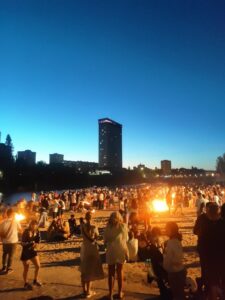
©Jan-Felix Wolters
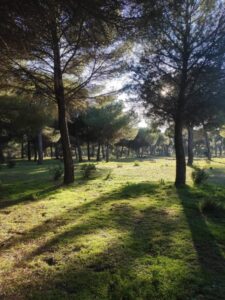
©Jan-Felix Wolters
Valladolid wouldn’t have been the city of my choice if it weren’t for my girlfriend, who is from there. My expectations weren’t very high, and got easily excelled by this mid-sized city in central Spain. It has a beautiful historic centre and even an artificial beach at the riverside. Located about 1 hour from Madrid by train and 2.5 hours from the north coast by car, the city is particularly well located in Spain. It gives you the possibility to regularly visit the capital or to rent a car for a cheap price and spend the weekend at the sea, surfing or enjoying the incredible nature of the north. What is more, it is surrounded by the beautiful and historic cities of Castilla y León, such as Salamanca, Segovia, Burgos and León, which are all worth a visit. Being the capital of its region is what makes Valladolid a very attractive city. While the weekdays are rather calm, on the weekends it attracts plenty of people from all around. This leads to the city offering a large variety of activities, sports, restaurants, bars and results in a high quality of living. The city hosts many events throughout the year, including regular and free public concerts on the Plaza Mayor, theatre and music festivals and the famous San Juan in June, where everyone goes to the beach to enjoy the longest night of the year at a bonfire. Valladolid also offers beautiful parks and an immense amount of terraces, where you can find some of the best and cheapest tapas in all of Spain. Drinks and food are extraordinarily cheap, which allows you to spend a big amount of your time outside, enjoying the Spanish way of living. Personally, I loved that it’s very easy to leave the city by bike or bus and be in the nature in the blink of an eye. It is also worth to mention, that the Spanish in Castilla y León is considered the clearest and easiest to understand in all of Spain.
The Hospital
I spent 2 months of my Internal Medicine internship at the Hospital Río Hortega and my 4 months of surgical internship at the Hospital Clínico. I can recommend both hospitals. While Río Hortega is a very modern and well equipped hospital located outside the city centre (12-15 minutes by bike), Clínico is located right in the heart of Valladolid, next to the Faculty of Medicine and has a nice and familiar touch to it. Generally it is important to say, that Spanish medicine students don’t get to participate in the daily hospital work near as much as German students. The working hours are from 8am to 3pm, but the doctors might leave earlier when the daily ward round and the examination of the patients are done. In Internal Medicine, the tasks are limited to following your assigned doctor and examining the patients. The doctors are generally very open and willing to explain you everything. There is no time pressure which leaves plenty of time to explain diseases and procedures. But the low patient flow also leads to a lower input compared to other countries. The emergency department was the only department where I got to assess my own patients and right down the anamnesis and reports before discussing the procedures with the doctors. In the surgery departments the Spanish students rarely take part in the surgeries. I was lucky to get to know a couple of doctors who would regularly let me take part in surgeries and perform assisting tasks like holding hooks, unscrewing screws or sew a few stitches. Although I definitely learned new things it was probably less compared to spending the same amount of time in a German hospital.
Conclusion
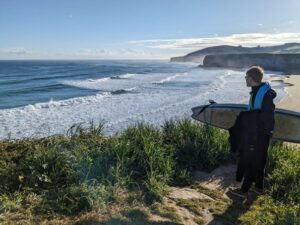
©Jan-Felix Wolters
I had a great time throughout my stay in Valladolid and am very happy to have gotten to know the country, the city and the people. Valladolid is a beautiful city and has much more to offer than one would expect at first glance. It may not be able to compete with Spains major cities when it comes to the cultural offer and nightlife but impresses with a high quality of life, easy access to the nature and a cheap cost of living.
Writing my Master Thesis in Trondheim
- Energy Engineering M. Sc.
- Norway, Trondheim
- Norges Teknisk-Naturvitenskapelige Universitet
- 01/2024-06/2024
Application / Finding an internship
To make new experiences and broaden my horizon I wanted to finish my academic studies with a stay abroad. So, I decided to do my master thesis in another country. I already had a research topic in mind and knew I wanted to go to another European country, thus I came across the NTNU in Trondheim, Norway – a place which seemed to be popular among engineering students from RWTH Aachen University. I did not apply for an advertised thesis, instead I had to demarcate the topic together with both my Norwegian supervisor and my German supervisor. Yet, the application process was surprisingly straightforward. I wrote an e-mail to the corresponding professor at NTNU, and he replied with a few hours and accepted my proposal. Additionally, I had to register myself as an exchange student at NTNU. The university’s international office was very supportive in that process. A benefit as an exchange student is that you are exempt from paying the semester fee.
Accommodation & living expenses
Since my stay in Trondheim was aligned with the Norwegian spring semester (January – June) I was given the chance to live in the Moholt student village (dorm). I can highly recommend Moholt to any exchange student because it makes your stay in Trondheim so much more enjoyable. First of all, the dorm rooms are very modern and well equipped. I lived in a 4-bedroom-apartment with three other students with shared kitchen and bathroom. The apartment had two big fridges, an oven with induction cooktop and a microwave – so well suited for cooking with friends. One big disadvantage is that the personal (bed)rooms are not equipped with a mattress. You either have to buy a new one (there is a furniture store right across the street) or get one from students who are leaving (there are Facebook and WhatsApp groups to organize buying and selling used stuff). Furthermore, there is a thing called Re:Store at Moholt where you can get used furniture and other household items for free which where donated by other students. In return, you can donate your used stuff when you leave. In case you need outdoor/hiking/sports equipment, you can go to the Bumerang store (also located at Moholt) where you can lend almost everything needed for outdoor activities (backpacks, skis, tents, …) without cost.
However, the best part of Moholt in my opinion is the Loftet. The Loftet is a common room located in the center of the village opened every day. It is equipped with tables where you can work as well as a lot of sofas where you can just relax. You can get a free cup of coffee or tea, pick one of a great variety of board games or play table tennis or video games on a PS5. The Loftet is run by very friendly volunteering students who work for Sit (the welfare organization for students) and can help you with almost anything. There are several recurring events, such as movie nights, quizzes, jam sessions, guided hiking tours etc. So, when you don’t know what to do – just go to the Loftet. The chances you’ll meet new interesting people and be involved in funny activities are quite high. It’s worth mentioning that the community at Moholt is very international.
Regarding the cost of living, the amount of money provided by the ERASMUS+ scholarship (750 €) was sufficient. The rent was approximately 400 euros (costs for internet and electricity are included). A six-months-ticket for the public transport costs about 250 euros. The food prices are extremely high compared to most other European countries. Especially basic groceries (water, milk, butter, cheese, vegetables) cost twice as much as in Germany. What’s also expensive is any close contact service, e.g. eating at a restaurant or going to the barber. Yet, if you are person who basically spends his or her money only (or mainly) on necessary things (groceries, toiletries, stationery, …) you will get along well with 750 € a month. If, on the other hand, you like to get take-away food often, go to clubs, bars, cinemas weekly, enjoy frequent shopping trips or have an expensive hobby, you might exceed the monthly stipend.
Everyday life / the internship
Paying bills in Norway works (almost) completely cashless. I have never held a Norwegian bank note in my hand, credit cards (or NFC-enabled smartphones) are accepted basically everywhere. Therefore, you should get a credit card that doesn’t charge fees for paying in foreign currency. Alternatively, you can link your PayPal account with Google Wallet. By doing that you also avoid those extra fees. Most Norwegians are fluent in English which makes communicating in everyday life very easy.
Since Trondheim is located quite northern on the globe the transition period from winter to summer is quite short. When I arrived in January the temperature was -13°C in the evening. There was a lot of snow until the beginning of April and the sun set very early (before 4:30 pm). Though from mid-April on there was a rapid change and in May temperatures sometimes went beyond 25°C and the sun did not set before 11 pm. So even when you finished working late, you could enjoy some hours of free time outside.
Working on my thesis was difficult in the first few weeks (and months to be honest). Since I had not applied for an advertised thesis a major, time-consuming part of my stay at NTNU was to formulate a research question which was relevant to both ‘sides’ (German and Norwegian). My Norwegian supervisor was actually the professor himself, who obviously has a tighter schedule than research assistants, which is why I did not meet him every week. The NTNU provides open offices at the campus particularly reserved for students. Unfortunately, the university cafeterias are extremely expensive (a meal costs 3-4 times as much as in Germany) which is why I worked from ‘home’ most of the time so that I was able to cook my own lunch.
Free time / tips
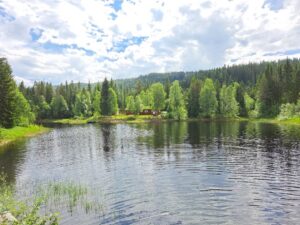
© Nils Baur
When you stay in Norway for a longer period, it is definitely worth experiencing the beautiful nature of the country. A great way to do that is going on a hike and staying overnight in one of the many cabins which NTNU owns. The cabins are neither equipped with electricity nor running water, to keep it warm you chop some wood and put it into the oven that is present in every cabin. Anything else – food, drinks, sleeping bags etc. – you must bring yourself. Although this may sound a little scary at the beginning, it really offers a cool and unique experience. Some cabins are located on a lake, some come with a sauna and above all you get a great view of the landscape.
From my experience, one might feel a little overwhelmed at first by all the opportunities to spend your free time. A good strategy is to start by joining the trips guided by the Sit students (starting at Loftet) to find out what kind of trip or activity suits you.
With the regard to writing a master thesis abroad, I’d recommend the following:
1) Align your stay in Norway with the semester cycle. That allows you to get a place in one of the student villages with all the benefits mentioned above.
2) If possible, find an advertised thesis with a (more or less) predefined research question. That will reduce the amount of required communication and coordination between your internal (your home university) and external (Norwegian) supervisor.
3) Draft a schedule for the different tasks of your thesis together with your supervisors. Think about what input you need from which supervisor (internal or external).
4) If you’re stuck at some point, don’t be afraid to ask your supervisor for help.
Conclusion
Trondheim is a great place to study. The people I have met there were extremely friendly without exception. The student welfare organization Sit provides a very comfortable living environment. It is important to take care of administrative stuff early enough (finding a topic and a supervisor, register as an exchange student, find housing, apply for ERASMUS funding, get adequate insurance). Yet, if you are facing problems during your stay there are many people and institutions who can help you. Personally, I would do some things differently in retrospect, nevertheless, I am very grateful for having made the experience.
Writing a master thesis in Italy
- Plastics and Textile Technology M.Sc.
- Italy, Bollate(MI)
- SYENSQO Specialty Polymers Italy S.p.A.
- 10/2023-03/2024
Application/Finding a master thesis
As in most study programs, you can choose to write your thesis at the university or externally in a company. For this reason, it was clear to me at an early stage that I wanted to write my Master’s thesis externally in order to gain further important practical experience. The contact to the former SOLVAY (SOLVAY has outsourced its Specialty Polymer Business Unit and founded its own company, which is now called SYENSQO) was made via the IKV Recruiting Speed Dating. There I was able to get to know my current supervisor in a brief in
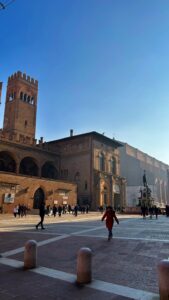
© Cihan Koyuncu
Bologna
terview and discuss my ideas about an external master’s thesis. It was no problem to get a confirmation, as both sides were interested in carrying out a Master’s thesis. As the Bollate site has never had a Master’s student outside of Italy before, in addition to the selection of the topic, a number of things had to be clarified with regard to insurance, contract, payment and other regulations. These points were resolved within almost a year via several meetings with various departments of the company or the university, so that I was able to start in Italy on time on 01.10.2023. For a good planning of a stay abroad, 9-12 months should be taken into account. If you are going to work abroad, you should find out about tax matters in advance. In the case of Italy, a Codice Viscale is required, which you can apply for at any Italian embassy in Germany.
Accommondation & Living expenses
Since I needed a furnished apartment, I used AirBnB to ask the various apartment providers for a long-term contract. This allowed me to reduce the price a little, as I was able to save on Airbnb’s fees and they were able to accommodate me in terms of price due to the 6-month stay. As Italians rarely speak English, there were considerable communication problems with some of the locals. For this reason, communication often took place via Deepl in order to at least get the message across. Financing an apartment in Milan would not have been possible despite the salary and the Erasmus money. That’s why I first lived in Limbiate and later in Magenta. This saved me the high rents in Milan. Nevertheless, I had to spend more on gas and have to travel 30-60 minutes to get to work, depending on the traffic. The remaining costs were comparatively slightly lower than in Germany. Despite this, I was able to travel a lot and generally had a very good time in Italy. Many museums and attractions are free for young adults under 25. Restaurants are comparatively cheaper as German restaurants and the quality of the food is significantly better. I was able to save some money, because the meals at work were free for me.
Everyday life/the internship
I had a 40-hour contract and therefore spent 9 hours a day in Bollate including a break. In the morning I left the house at 8:30 a.m. and was there at around 9:15 a.m. Because the working hours were flexible, I was able to come and go whenever I wanted. The most important thing was that I fulfill my tasks with high quality and at the same time deliver them on time. Due to the early work traffic, I deliberately drove to work later and was therefore able to reduce travel times. Whenever my supervisor worked from home, I was also allowed to work from home. At Syensqo, in addition to my master’s thesis, I took part in regular work operations and was therefore able to help out with some projects on the side. I was able to get to know many colleagues from the site, exchange ideas and work together. Among other things, we had contact with colleagues in Lyon, France and Alpharetta, USA. The lunch break enabled me to get to know my colleagues better.
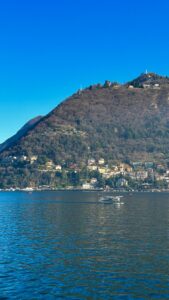
© Cihan Koyuncu
Lake Como
Here in Italy great value is placed on food culture. In the canteen there is a first (primi) and second (secondi) course in addition to salad and dessert every day. After every lunch break we sat down together for an espresso. Afterwards you were fit enough to devote yourself to work again.
The master’s thesis was about the comparison of high-performance tribological plastic compounds with and without PTFE. I examined the tribological parameters (COF, wear, PV limit) of various compounds and compared them with each other. This made it possible to determine the effect of graphite and other tribological additives on the tribological properties. In addition, two different methods for determining the tribological properties were compared.
After work there wasn’t much time left for other activities. I often did sports or studied for upcoming exams in the evenings. I was also allowed to fly back to Germany for the exams and work from my home office for several weeks. I was also able to get to know SYENSQO’s German location in Duesseldorf. What pleasantly surprised me was that even in Germany the colleagues were international. My colleagues were therefore predominantly Italian, but there were also some French, Austrian, Irish, Turkish and German colleagues. The working language was English, which is why my English improved significantly over these six months. But I also had the opportunity to learn some Italian.
It was particularly exciting to find out about everyday matters in Italy, all of which are different in Germany. Shopping, paying tolls or even washing the car was a bit of a challenge at first, but we were quickly able to figure it out with the help of the internet and by asking the locals. Even though many Italians were either unwilling to speak English or simply couldn’t speak it, a lot was communicated via gestures and facial expressions and, if necessary, communicated directly in Italian using Google Translate.
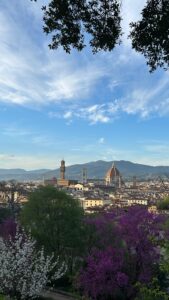
© Cihan Koyuncu
Florence
Free time/tips
During the six months I was there, I wanted to see as much of Italy as possible. That’s why I spent most of my free time at the weekend travelling around the cities. The cultural sights and churches in particular are a definite must-see. The train connections in Italy are very good, much more punctual than in Germany and comparatively cheaper. I often slept in cheap hostels so that I could finance this amount of travelling. You can be lucky, but you can also be unlucky, which is why it’s well worth doing your research beforehand. Most sights in Italy are free for EU citizens under 25. Student discounts are rare, but in the cases where they were offered, I often didn’t have to show anything. Tickets for attractions could often be booked online in advance, which saved precious waiting time. However, you often had to pay by credit card. Here is a list of the cities I visited and my most important tips for a stay there.
Milan
Despite the fact that it is a world metropolis, Milan is actually the city that is least worth seeing in my opinion. This is not because the city itself is not beautiful, but rather because I liked all the other cities much better. The main sights in Milan are the cathedral and the Galleria Vittorio Emanuelle II, both of which are located directly on the cathedral square. You can visit the cathedral and even go up to the roof of the cathedral. Milan’s Arc de Triomphe and the neighbouring park are also very beautiful. If you walk through the park, you quickly come to a former castle, which you can also visit. There are many culinary options in Milan. Above all, a visit to China Town is worthwhile, especially in the evening. You can also visit the Cimitero Monumentale (Milan’s old cemetery) with its incredibly beautiful sculptures and tombs. Important Milanese personalities are also buried there, so it’s worth checking out who is buried there first. You can also visit the original “Last Supper” by Da Vinci in Milan. However, getting tickets for this was much more complicated than usual, which is why I unfortunately missed it.
Como
If you live near Como, I think it’s worth making several trips to Como and especially to enjoy the beautiful view.
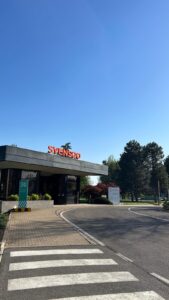
© Cihan Koyuncu
Syensqo
Como is located on Lake Como and from there you can visit the numerous small villages on the lake. It is probably one of the most beautiful places in Italy, especially in summer. In Como, you can also book tickets for a boat tour that will take you to the villages on the lake.
Bergamo
Bergamo is one of the smaller cities in the Milan metropolitan region. Bergamo’s old town is situated on a hill, so you can either climb up the numerous steps or take the mountain railway (€1.70 each way). A beautiful old town centre awaits you at the top. The two churches on the market square are particularly worth a visit. I can particularly recommend foccacia at Il Fornaio and the original and first straciatella ice cream at La Marianna. A short day trip is enough to fully explore Bergamo.
Verona
Verona also has a beautiful old town centre. I was only able to stay there for a few hours on the way back from Venice. I can only encourage everyone to visit this city. Verona is also the city of Romeo and Juliet.
Venice
I don’t think I need to say much about Venice. Beautiful city with numerous canals, but unfortunately with a lot of tourists. Even if you just stroll through the streets of Venice, you can see a lot of beautiful things there. The big sights are definitely the Doge’s Palace and St. Mark’s Basilica. The Venice Opera is definitely worth seeing.
Turin
Very few people have an eye on the city on the Po. Still a very beautiful city that is definitely worth a day trip. The Musei Reali contains some really beautiful art and should definitely be visited. There is also a very nice car museum in Turin for all car enthusiasts. But definitely don’t miss the opportunity to take a walk along the Po.
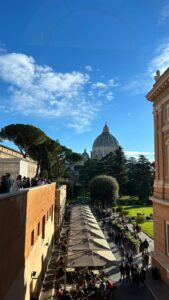
© Cihan Koyuncu
Vatican
Genoa
The largest connected old town in the world can be found in Genoa. I was rather suspicious when I looked at the pictures on the Internet, but I was even more enthusiastic about this city once I was there. Therefore a must for everyone who wants to see a very extravagant, very wealthy city in Italy with a French flair.
Florence
The city of the Medici, an absolute must-see for anyone who has been to Italy. The Galleria dell’Academica and the Uffizi are a must-visit, especially for art enthusiasts. There you can see, among other things, the impressive original David sculpture. The magnificent Duomo in Florence is beautiful from the outside. But save yourself the waiting time and don’t go in, as it’s even bareer inside. For everyone who likes to learn about the history of Italy and Florence. Most and important Medicis, Donatello and 1-2 popes are buried in the Medici Chapel. You can get a good view of the city from one of Florence’s gardens, but you have to pay an entrance fee. Instead you can go to Piazzale Michelangelo and watch the sunset from there. You can get a good view of the city from one of Florence’s gardens, but you have to pay an entrance fee. Instead you can go to Piazzale Michelangelo and watch the sunset from there.
Rome
You should generally plan 3-4 days for Rome because you can see so much. Therefore, you should plan well in advance. The only tip I would like to give about Rome. Be sure to book tickets for the Vatican Museum in advance (1-2 weeks in advance). Otherwise you have to wait in line for up to 3 hours. But it was still worth it because you can see, among other things, the Sistine Chapel and with it the famous chapel painting by Michelangelo (The Creation of Adam).
So as became clear, spending time on weekends, holidays and good planning meant I was able to travel a lot. Even though this meant foregoing most of the other luxuries, I think I made the most of my time in Italy.
Conclusion
I am very satisfied and grateful for the opportunity to have been abroad. This would not have been possible without the support of Erasmus+. Not only was I able to gain important experience but I was also able to grow as a person. Living abroad is an experience that I would recommend to everyone and that will definitely provide personal growth. From today’s perspective I might approach certain points differently, but overall I’m very happy with how these six months went. The six months at SYENSQO also showed me what the working world looks like in other countries and how it can differ from that in Germany. Important experiences that I will carry with me in my life regarding international understanding. I can only recommend that everyone take a stay abroad as part of their studies. Above all, I can recommend everyone to visit this beautiful country, absorb the culture and experience all the beautiful things that I could only touch on here as part of the report.
Working as a Foreign Language Assistant in Dublin
- Master of Education
- Ireland, Dublin
- Colaiste Chilliain
- 10/2023 – 03/2024
1. Application/Finding an internship
I first learned about the “Foreign Language Assistant” program through friends. The application process
was comprehensive but straight-forward and needed to be completed by January. It required submission
of a CV, Letter of Motivation, transcript of records, certificate of study, and a university report
(Hochschulgutachten) from a Professor (some documents needed to be submitted in English + German,
this varied according to your chosen destination country). The program encompassed numerous countries
with varying internship durations but Ireland, offering a placement of 6-8 months, resonated most with my
preferences. Moreover, Ireland was one of the very few destinations that allowed me to indicate preferences
according to the destination COUNTY. I could give three preferences and chose county Dublin as my first,
since I expected this would be the spot with the highest frequency of FLA placements (which turned out
true!). Following the initial application, I progressed to the second stage, receiving an invitation for an
interview with representatives of PAD in March. In May, I was then finally informed that I had been accepted
to the program, so I immediately applied for Erasmus funding and a break semester (Urlaubssemester). By
June 1st, I received my school assignment along with the instruction to contact the principal and introduce
myself immediately, since Ireland would be starting the summer holidays on June 2nd. I did as told and
received an answer on the same day.
2. Accomodation & Living expenses
I started looking for accommodation as soon as I got the notice, but I quickly discovered the harsh realities
of Dublin’s sky-high prices and housing issues. I searched platforms like Daft.ie and HostingPower which I
was told about by a former FLA. There were new offers daily on Daft.ie, but most were either extremely
expensive, seemed rather unpleasant or were labeled as “on a mon-fri basis”. Additionally, HostingPower
operates on a commission base, which means you pay a fee if you find accommodation through their
agency. However, the offers on HostingPower are always reviewed and approved of by their staff, so the
places are usually nicer than on Daft.ie. I think it’s important to point out the following: almost all options
were rooms inside a family home – there were almost no student flat-shares (WGs), which I was a little
struck by, since Dublin is a rather large University city that houses a lot of students. So prepare yourself to
live with a “host” family. I came upon the question of whether to prioritize proximity to school or the city
center and initially decided on the latter, but the matter was decided FOR ME by the housing crisis itself,
leaving me little room for choice. I contacted countless ads for weeks but only two even replied in total.
Eventually, I managed to secure a room in a suburb/town through Daft.ie, that meant a good 50-minute bus
ride from the city and 25 minutes from school. Looking back I wouldn’t call this a problem since there were
so many buses that operated between my place and the city center which made going up to Dublin really
easy. However I still find the rent of 800€/month PLUS expenses like gas, electricity, and WiFi adding
another 100€/month very excessive for a room 50 mins from the city center. But this seems to be the reality
you have to face when moving to Dublin, most of the other FLAs had similar rents. My experience with my
landlady however was rather unpleasant. She acted welcoming at first but then later expected me to
basically disappear into thin air every time she was home. She would prefer if I could manage it so that she
“doesn’t really notice I’m there” (???) She gave me a list of time slots in which she’s not home and asked
me to please limit my time in the common rooms (e.g. to cook meals, do laundry, shower etc.) to those time
slots and to otherwise be quiet (she didn’t use those words directly, but that is what she expected). She
was downright delusional. It made the living situation really uncomfortable but in the end I managed to work
around her. This was just MY unlucky experience, other FLAs had great flats – I guess you can never know
if your pick was good until you live there a few weeks. There is no strategy to the housing matter, you just
need a little luck which I hope you will have!!
What you will have to acquaint yourself with is that Dublin in general is a rather expensive city. Still I would
say in hindsight that your salary plus your Erasmus grant will be enough. I didn’t really have to restrict
myself expenses or count every penny though I still tried to spend responsibly. I prioritized trips and
brunches/dinners over pubs and beers, but that is just my personal preference :). Also, a lot of museums
and galleries are free for students or at least discounted. The offers for students are great, so make sure
to look into that. Grocery shopping I mostly did at Lidl and Aldi which are the cheapest options. The Lidl+
App is a game changer when trying to save money, they have amazing offers, you just need the app. Tesco
and Dunnes are great for meal deals and offer a larger assortment. They also have saver options
(Clubcards), but you need an irish phone number to apply for those, I think. Public transport fares like
busses, the Luas (tram), and the Dart (train) are way cheaper if you have a student leap card. It’s an ID
card that you apply for online. You use it to pay public transport and top it up with money via an app. The
whole concept is brilliant if you ask me, there is even a weekly limit to your spendings, which means if you
reach that limit, you travel for free. Cosmetics (shampoo, make-up, moisturizers) and anything drugstore related are really expensive compared to Germany, so if possible, stack up on those at home. You prettymuch will not need cash anywhere, which I found to be really handy. Everything is paid by card, some
places don’t even take cash. My German debit card worked perfectly fine but I switched over to a Revolut
account (including a digital debit card) since I had to pay my rent via Revolut as well.
3. Everyday life/ the internship
I worked at an Irish secondary school on a 12h/week basis. The 12 hours were to be completed from
Monday – Thursday, Friday was a day off. All FLAs usually get either Monday or Friday off in order to be
able to take trips and explore the country. We were all very fond of this rule . So at school I attended 12
German lessons divided between two German teachers. The classes at my school were 60 minutes each,
but other schools also had 45 minute classes.
As a Foreign Language Assistant, my main task at school was to assist the teachers in their lessons. In my
case, this really meant “just assisting” in the beginning. I watched the lesson and helped students where
help was needed. Later on, I planned out little bits about German culture, geography, holidays. I reached
out to the teachers with my ideas, but to my surprise I often heard back “Oh that sounds lovely, but I’m
afraid we have such a tight schedule, maybe next class” or something along those lines. So all in all my
main tasks at school did not really include educating about German culture but rather just assisting and co-teaching stuff from the textbook.
I also did a lot of correcting class tests, vocab tests and homework
assignments, which I enjoyed a lot. Occasionally I did some one-on-one work with students who needed
some additional practice and I helped prepare the leaving cert students (Abiturjahrgang) for their final
exams in German. Looking back on my time, I can say that my role as Language Assistant was not very
well defined. On some occasions, the teachers didn’t seem to know how to make effective use of me and
my qualities. At the end of the day, I still believe that my work affected the students in a positive way and
made them realize that there can be fun in German class, but I would have preferred to be a little more
involved – especially because I expected this program to enable me to improve my own teaching skills /
lesson planning. However, the rather “small” workload (in my case!!!) enabled me to prioritize exploring the
country, which I’m definitely not mad about!
A major issue that I struggled quite a bit with was the language of interaction at school. Technically, Irish
the official language in Ireland but in reality, it is rarely used in day-to-day life. Only some regions on the
Westcoast (they are called Gaeltachts) actually speak Irish daily. The majority of Ireland’s people don’t
speak the language fluently. However, some schools in the greater Dublin Area made it their mission to
revive Irish as a spoken language and bring back some of the forgotten culture (which is an amazing
proposition!). Those Gaelscoils use Irish as the language of interaction and instruction, which means that
no English is spoken at any time by any person on the school grounds. Turns out, I was allocated to a
Gaelscoil. I don’t speak Irish. Sounds quite non-sensical, huh? Spoiler though: It all turned out fine and was
actually really interesting! Of course, the staff and students were all very considerate and always used
English when talking to me. However, there were still some things that I struggled with and made me feel
a bit lost at times. Interacting with my colleagues and just casually chatting in the staff room can be hard
when everyone around you is speaking a language you don’t understand. You can’t just casually drop into
a conversation you overheard with a “oh yeah, that exact thing happened in my class last Friday, too” or
“What is the name of that pub you’re talking about?”. This led to me not really feeling close to most of my
colleagues, I mostly talked to the German teachers I was assigned to. One of them was actually half
German half Irish, we got along really well and she didn’t speak Irish either, meaning her lessons were held
in English. My other teacher strictly spoke Irish during the German lessons which made me feel a bit left
out and awkward. My time at the school was challenging in some ways, but we made the best of it! I learnt
a lot about Irish culture and picked up some bits of Irish, which was fun!
4. Free time/tips
As I said, the FLA program is designed to give you the time and space to do travelling and exploring, which
is fantastic. Most of my weekends were spent with other FLAs in the Dublin Area, we planned a lot of
activities in Dublin and trips around the country. We went out for brunch, coffee and dinner a lot, most of
us not being heavy drinkers so we prioritized restaurants and cafés over pubs. Dublin offers uncountable
options. Just go strolling through town and every 2 minutes you’ll walk past a place that you’ll want to try.
Activity-wise I recommend checking out everything that is free (or discounted) for students: museums, art
galleries, markets. Free-walking-tours are a great way to get a first impression of the city’s must-see places
AND hidden gems. In general, Ireland’s nature and national parks are great for hiking. Sadly, most of the
spectacular hikes are not accessible via public transport, but renting a car to do a trip with some friends is
definitely worth it. Driving on the lest side might be intimidating at first, but you’ll get the hang of it in no
time! Keep in mind though that roads on the countryside can be very narrow and curvy and driving in the
city can be stressful. I recommend renting a car at the airport, since that is usually a little further outside of
the city. During the mid-term break (one week off school in November and February) we took a trip to
Scotland, which was a real highlight. Below you will find a list of recommendations
– Trips around the country
o Kilkenny – 2 hours from Dublin, cute small town, beautiful norman castle
o Galway – 4 hours from Dublin, west coast flair, very cute around Christmas time
o Cork – 3 hours from Dublin, great town & university
o Belfast – Northern Ireland, very pretty city
o Sligo – Sligo city is rather dull but it’s close to Strandhill, surfers paradise, great hiking
options in the whole county (e.g. Queen Maeves grave)
o Killarney + Ring of Kerry – great national park, amazing views, Paddywagon does a great
bus tour
o Wicklow Mountains
– Trips to other destinations
o Edinburgh + Glasgow – great cities
o Scottish highlands – amazing views
– To do in/around Dublin
o Howth cliff walk
o Bray + Bray head
o Malahide + castle
o EPIC Museum
o Craic Den Comedy Club
o Irish Film Institute (for movies)
o Brunch at “Joy of Cha”
5. Conclusion
To conclude: I would recommend doing the FLA program to anybody wanting to explore Ireland (or any
other country they offer). Working at a school and „teaching“ German will give you a whole new perspective
on your own language and it will benefit you in a lot of ways! The Erasmus+ internship grant will enable you
to make the most out of your time. This experience along with all the lovely people I met are now a part of
me that I never want to miss! Time spent abroad will always have some ups and downs, but you will gain
so much from every experience (positive AND negative)
Research Internship in Valencia
- Chemistry M.Sc.
- Spain, Valencia
- Universitat de València
- 01/2024 – 04/2024
Application and finding an internship:
After careful consideration, I was convinced that Valencia was the right city for me. I had heard many good things about Valencia: the city seemed to offer what I was looking for, and, as I expected, people spoke “normal” Spanish.
Subsequently, I wrote emails with my resume and academic transcripts to professors and group leaders at universities and some independent institutes. My recommendation would be to reach out to as many as possible. Out of 25 recipients, approximately 15 responded; 10 were unavailable, lacked capacity, or only took interns for longer periods. Among the 5 positive responses, I scheduled short meetings with 2 individuals to make the most informed decision possible. In the end, I decided to do an internship in inorganic chemistry at the University of Valencia. The professor spoke good English, the laboratories were spacious and modern, and I had the feeling that they were happy to have an additional motivated employee.
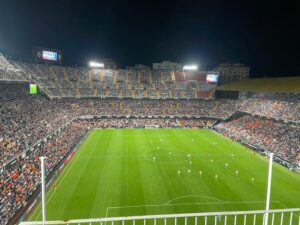
© Jona Sieberg
Accommodation & Living Expenses:
I found searching for accommodation from Germany, without knowing Spanish, to be quite challenging. While many recommended Idealista as the best possible website, where you can find a lot, I ultimately found my apartment through Uni-Places. Although there was a fee involved, it also provided a certain level of security against scams. I live incredibly centrally, not really close to the university, but with the free public transport (for people under 30), I can reach my workplace in 35 minutes. However, I have found Valencia to be very well connected, so the exact location of your flat is not so important.
When I first started looking for an apartment I would have liked to live alone, but decided to go for the cheaper option of a shared flat. In retrospect I would now strongly advise everyone to do the same. Social interaction and contacts are one of the core elements of an Erasmus stay, which should not be missed at any point. Based on my experience with shared accommodation and hearing about others’ experiences, there will always be pros and cons, but I have not heard from any situations that were unbearable.
Sidenote: During the summer months, a room without air conditioning is maybe somewhat bearable but not very desirable.
Monthly expenses for groceries in the supermarket are certainly somewhat lower than in Germany, although not by much. The only thing that is a little more expensive than what we are used to is Ice-cream. Everything else depends on your lifestyle.
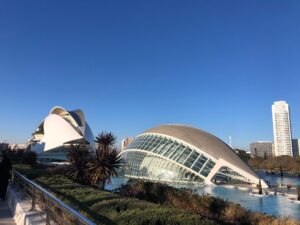
© Jona Sieberg
Prices for shared rooms range from approximately 300 to 550 euros. Clubs are often free through Erasmus organizers, and restaurants and gyms are also slightly cheaper than in Germany.
Everyday Life / The Internship:
My internship itself didn’t really differ from similar tasks in Germany: I worked in the laboratory, sometimes under supervision, mostly independently. Only the feeling of arriving in a group of Spanish people, making friends, and then also doing things together outside of university felt even cooler. I dealt with great people, a relaxed yet dedicated professor, a doctoral student with whom I couldn’t have gotten along better, and a generally very friendly group. The willingness to help each other was high, working hours were very flexible, and hierarchies were flat.
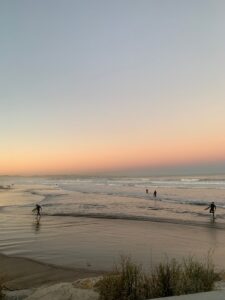
© Jona Sieberg
In this regard, my impressions were minimally different from Germany. I was usually in the lab between just before 10 am and 6 pm, but as everything was relatively relaxed, a lot of it was voluntary. Overall, there was certainly time for sports, activities on the weekends, and enjoying the feeling of living in Spain! I found it to be a great opportunity to expand my knowledge, learned a lot, and certainly gained more confidence in my abilities through the experiences I had.
The biggest difference in everyday life: You don’t have to look out the window to know what the weather is like. Valencia lives up to its promises and offers, although it may not be the most beautiful city in the world, good weather, nearly every day.
My hope was to make great progress in Spanish as well as gaining professional experience. This is perhaps possible if you already speak relatively good Spanish, but as long as English is still much easier for both sides, I had little success. The university, as the place where I spent most of my time, is simply unsuitable for this, as people here speak generally better English than elsewhere.
Free Time / Tips:
Beach, great weather, culture, local markets, the feeling of a big but not too big city, clubs, parks, huge university campuses, and all of it easily accessible. As mentioned, there is certainly no shortage of options. Erasmus organizations offer a particularly easy entry, offering a variety of activities. For example, I participated in their surfing and beach volleyball offerings, parties, and excursions. The excursions, in particular, are very pleasant because you can reach nearby cities or locations relatively inexpensively. Especially the mountains, which are otherwise difficult to reach without a car.
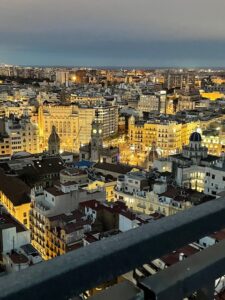
© Jona Sieberg
Valencia certainly does not lack bars where you can sit down nicely in the evening. Additionally, there are also many opportunities to sit outside with your friends. If I were to make a recommendation, I would suggest the very authentic Mercabañal, located very close to the beach.
As an absolute Erasmus hotspot, one should not expect to only deal with spanish people. On the contrary: It is very international, and this is reflected wherever students are. While I mainly dealt with Spaniards in the lab, my roommates and the visitors to clubs and bars were often from abroad.
I used my free time a lot to do sports, often in the gym, partly because it was often much cooler there. Running is a bit less pleasant in Valencia than in Aachen, but with the Turia (the largest park that leads in a semicircle through the city), there is an extremely bicycle and jogger-friendly park. Various football fields are also located here, where people often meet up through WhatsApp groups.
Conclusion:
I can highly recommend Valencia as a destination for an Erasmus stay. At the end of my time here, I feel like I have participated in the hustle and bustle of a Spanish university and made progress in my field, as well as had a great time in Spain. The only thing Valencia doesn’t offer is the feeling of being in a super fancy metropolis with incredibly modern skyscrapers. For everything else you hope for from your stay abroad, Valencia offers the ideal conditions. You just have to do it! Have fun!

